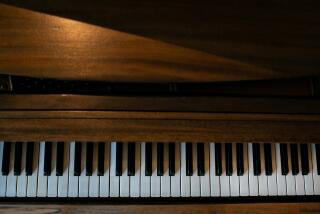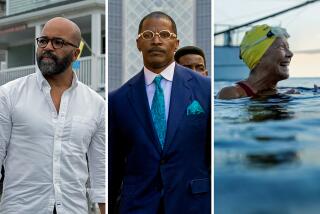New England triptych
- Share via
SAN FRANCISCO — John Adams is inescapable these days. “On the Transmigration of Souls,” which opened the New York Philharmonic season in September, has just won the Pulitzer Prize and is the first artistic work commemorating Sept. 11 that is likely to last. The Los Angeles Philharmonic recently staged the oratorio “El Nino” and took it to New York as the highlight of Lincoln Center’s current Adams festival. A groundbreaking new film of Adams’ opera “The Death of Klinghoffer” had its premiere at the Sundance Film Festival. Next September, Adams will conduct the opening concert in Carnegie Hall’s new theater, Zankel Hall. In October, he will contribute a new piece for the opening of the Walt Disney Concert Hall.
But Adams’ heart -- and home -- remains in San Francisco. Wednesday night, in Davies Symphony Hall, the San Francisco Symphony premiered “My Father Knew Charles Ives,” the fifth work it has commissioned from Adams, the eighth that it has premiered and the first in a group of four Adams works that it will premiere over the next 10 years. Intensely proud of its association with the composer, the orchestra and its music director, Michael Tilson Thomas, will take the new piece on a European tour that begins next week and play it next season in San Francisco and New York.
His father did not know Charles Ives, but Adams told the audience at a preconcert talk that meeting Tilson Thomas’ father got him thinking about the similar relationship he and the conductor had with their fathers. In both cases, the fathers felt far closer to music and art than to their businesses, and encouraged their sons’ musical talents. Adams’ father was a halfhearted traveling salesman in New Hampshire who played clarinet in swing bands on the side and taught the instrument to his son. Tilson Thomas’ father was a scriptwriter in Los Angeles whose true loves were piano and painting.
Ives, too, had such a connection with his father, a bandmaster. And then there is the kinship both Adams and Tilson Thomas feel toward Ives as the father of American music. Ives has long served as an inspiration for Adams; “Transmigration,” for instance, takes off from “The Unanswered Question.” Tilson Thomas has long been a great Ives conductor.
Paternalism on many levels thus characterizes Adams’ deeply affectionate new score, which lasts about 28 minutes. Using Ives’ “Three Places in New England” as a model, Adams recalls three meaningful places from his own childhood in New Hampshire. The first, “Concord,” the small town in which he grew up, has a pastoral opening. A soft sustained chord in the strings, chirps in the winds and glittery sounds of harp, piano and celesta are a backdrop for a lingering Ivesian trumpet solo. It sounds like Ives updated -- less craggy, more jazzy, more professional.
The texture thickens, a collage of tunes appears in the background. Many of the tunes have personal associations for Adams, such as an early Beethoven ditty he used to play with his father as a clarinet duet. The movement reaches a riotously enjoyable climax, again Ivesian, but without as much mess.
The second movement, “The Lake,” re-creates the sound of swing bands floating over Lake Winnipesaukee from a dance hall in the distance. It was in such a dance hall that Adams’ parents met, and this is a wonderfully impressionistic interlude. The final movement, “The Mountain,” is exuberant. The first movement’s trumpet solo returns, only to be overwhelmed by the orchestra in Adams’ familiar chugging style. Tilson Thomas, who conducts Adams with the same depth he brings to Ives, did a superb job of revealing the rich texture of Adams’ orchestration. The San Francisco Symphony made the final minutes a thrilling ride.
“On the Transmigration of Souls” and the recent “Guide to Strange Places” have reflected Adams’ dismay and sadness. It is music embedded in an optimistic American tradition, but things go awry. “My Father Knew Charles Ives” makes an effort to retain that optimism, and it seems that the only way Adams can now do this is through nostalgia, for his childhood, his musical heritage, his own earlier work.
The result is still oddly melancholic. Diverting as it is, the new work, in its referrals to Ives, seems to suggest that there is less optimism to be found in what we are today than in what we once were. In a bit of inspired programming, Tilson Thomas reminded us that other composers, especially the melancholic Russians, often felt that way as well.
Hilary Hahn was the soloist in Stravinsky’s neoclassical Violin Concerto, and it was interesting to hear a commanding young player struggle to find the propelling force in this score. Tilson Thomas ended the concert with an interpretation of Tchaikovsky’s Suite No. 3 that brought a tremendous amount of complexly nuanced character to the work’s neo-Mozartean touches.
More to Read
The biggest entertainment stories
Get our big stories about Hollywood, film, television, music, arts, culture and more right in your inbox as soon as they publish.
You may occasionally receive promotional content from the Los Angeles Times.











